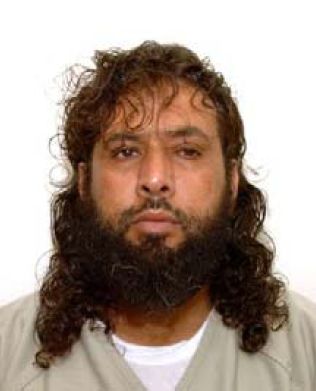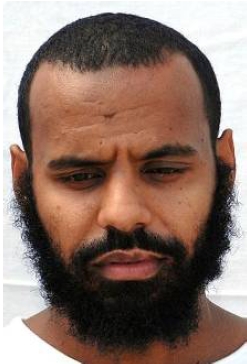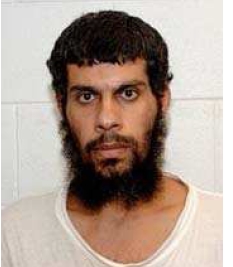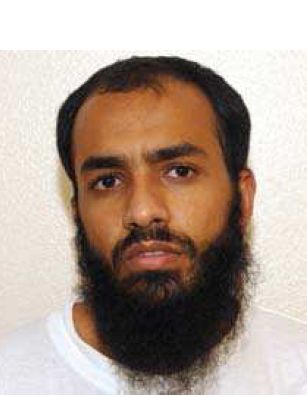Related Research Articles
Majid Mahmud Abdu Ahmad is a citizen of Yemen who was held in extrajudicial detention in the United States Guantanamo Bay detainment camps, in Cuba. His Guantanamo Internee Security Number is 41. The Department of Defense reports that he was born on June 15, 1980, in Al Buraiqeh District, Yemen.
Abu Bakker Qassim is a Uyghur from China's western frontier, Xinjiang Uyghur Autonomous Region who was held in the United States Guantanamo Bay detention camps, in Cuba. His Guantanamo Internment Serial Number was 283.

Bashir Nashir Ali Al-Marwalah is a Yemeni, who was captured in Pakistan, on September 11, 2002, and transferred to extrajudicial detention in the United States Guantanamo Bay detention camps, in Cuba. His Guantanamo Internment Serial Number is 837. Joint Task Force Guantanamo counter-terrorism analysts reports that Al-Marwalah was born on December 1, 1979, in Al-Haymah, Yemen.

Khaled Ahmed Qasim is a Yemeni citizen who has been held in extrajudicial detention in the United States Guantanamo Bay detention camp in Cuba, since May 2002.
Abdul Rahim Muslim Dost is an Afghan Salafi jihadist militant who served primarily with the Taliban, and later, as a founding member of ISIS–K. Dost's militancy began by age 19, when he left Afghanistan to join the Ikhwan, carrying out the Grand Mosque seizure in Mecca, Saudi Arabia before most of the group were captured and executed, though he escaped to Peshawar, Khyber Pakhtunkhwa, Pakistan. By 1986, he had returned to Afghanistan to fight in the Soviet–Afghan War as a member of Jamaat al-Dawah ila al-Quran wal-Sunnah, a Salafist forerunner to the Taliban. Following the Soviet withdrawal, he joined the Taliban as they ascended to power in the 1990s. During the US invasion of Afghanistan in 2001, Dost was arrested and held in the US detention camp at Guantanamo Bay, Cuba, where he was noted for his poetic writings. In April 2005, he was released following a Combatant Status Review Tribunal, and returned to Peshawar, but was quickly recaptured by the Pakistani ISI, before ultimately being released in a prisoner exchange between Pakistani government and the Pakistani Taliban (TTP) in 2008. From his release from Pakistani custody through 2014, he was active with the Taliban in the Afghanistan-Pakistan border region, until swearing allegiance to the Islamic State's Khorasan Province in 2014. In late 2015 he purportedly left ISIS–K and the life of militancy, publicly condemning the group's emir, Hafiz Saeed Khan, as "illiterate" for approving attacks on civilians, however he reportedly maintains his allegiance to Abu Bakr al-Baghdadi and the broader Islamic State.

Mohamed Atiq Awayd Al Harbi is a citizen of Saudi Arabia formerly held in extrajudicial detention in the United States's Guantanamo Bay detention camps, in Cuba. His Guantanamo Internee Security Number was 333. The US Department of Defense reports that he was born on July 13, 1973, in Riyadh, Saudi Arabia.

Mullah Abdul Rauf Aliza, widely identified as Mullah Abdul Rauf Khadim, was an Afghan militant who served as a senior leader in both the Taliban and ISIS-K.
Faris Muslim al Ansari is a citizen of Afghanistan who was seventeen years old when captured and held in the United States's Guantanamo Bay detention camps, in Cuba. His Guantanamo Internment Serial Number was 253. American intelligence analysts estimate that Al Ansari was born in 1984 in Mukala, Yemen.
Karam Khamis Sayd Khamsan(also transliterated as Karama Khamis and Khamis Al-Mulaiki) is a citizen of Yemen who was held in extrajudicial detention in the United States Guantanamo Bay detainment camps, in Cuba. His Guantanamo Internment Serial Number was 586. American intelligence analysts estimate that Khamsan was born in 1969, in Al Mahra, Yemen. He was repatriated without ever being charged on August 19, 2005.

Omar Khalifa Mohammed Abu Bakr Mahjour Umar is a citizen of Libya who was held in extrajudicial detention in the United States' Guantanamo Bay detention camps, in Cuba, from August 5, 2002, until April 4, 2016. Abu Bakr's Guantanamo detainee ID number is 695. American intelligence analysts estimate that Abu Bakr was born in 1972 in Al Bayda [sic], Libya.

Ha'il Aziz Ahmad Al Maythal is a citizen of Yemen, who was held in extrajudicial detention in the United States Guantanamo Bay detention camp, in Cuba. American intelligence analysts estimate that he was born in 1977, in Zemar, Yemen.
Abd al-Salam al-Hilah is a citizen of Yemen, held in extrajudicial detention in the United States Guantanamo Bay detainment camps, in Cuba.

Salem Ahmed Hadi Bin Kanad is a citizen of Yemen, who was held in extrajudicial detention in the United States Guantanamo Bay detainment camps, in Cuba. His detainee ID number is 131. Joint Task Force Guantanamo counter-terrorism analysts reports that Hadi was born on January 15, 1976, in Hadhramaut, Yemen.

Tarek Ali Abdullah Ahmed Baada is a citizen of Yemen, who was formerly held in extrajudicial detention in the United States Guantanamo Bay detainment camps, in Cuba. His detainee ID number is 178. Joint Task Force Guantanamo counter-terrorism analysts estimated that Baada was born in 1978 in Shebwa, Yemen.

Ayoub Murshid Ali Saleh is a citizen of Yemen who was held in extrajudicial detention in the United States Guantanamo Bay detainment camps, in Cuba. His Guantanamo Internment Serial Number is 836. The Department of Defense reports that he was born on April 29, 1978, in Usabee, Yemen.

Sharqawi Abdu Ali al-Hajj, also known as Riyadh the Facilitator, is a Yemeni alleged Al-Qaeda associate who is currently being held in the United States' Guantanamo Bay detention camps, in Cuba. He is accused of being a 'senior al-Qaida facilitator who swore an oath of allegiance to and personally recruited bodyguards for Osama Bin Laden.

Mohammed Rajab Sadiq Abu Ghanim was held in extrajudicial detention in the United States Guantanamo Bay detention camps, in Cuba, for almost fifteen years. His Guantanamo Internee Security Number is 44. He was eventually transferred to Saudi Arabia
Rafiq Bin Bashir Bin Jalud al Hami is a citizen of Tunisia, who was formerly held for over seven years without charge or trial in the United States's Guantanamo Bay detention camps, in Cuba. His Guantanamo Internment Serial Number was 892. The Department of Defense reports that he was born on 14 March 1969, in Tunisia.

Muktar Yahya Najee Al Warafi is a citizen of Yemen, who was held in extrajudicial detention in the United States Guantanamo Bay detainment camps in Cuba. The Department of Defense estimate that Al Warafi was born in 1974, in Ta'iz, Yemen.

Muhammaed Yasir Ahmed Taher was a citizen of Yemen, who was held in extrajudicial detention in the United States's Guantanamo Bay detention camps, in Cuba. His Guantanamo Internment Serial Number was 679. American intelligence analysts estimate he was born in 1980, in Ibb, Yemen.
References
- ↑ "List of Individuals Detained by the Department of Defense at Guantanamo Bay, Cuba from January 2002 through May 15, 2006" (PDF). United States Department of Defense . Retrieved 2006-05-15.
 Works related to List of Individuals Detained by the Department of Defense at Guantanamo Bay, Cuba from January 2002 through May 15, 2006 at Wikisource
Works related to List of Individuals Detained by the Department of Defense at Guantanamo Bay, Cuba from January 2002 through May 15, 2006 at Wikisource - ↑ Margot Williams (2008-11-03). "Guantanamo Docket: Samir Naji al Hasan Moqbel". New York Times.
- 1 2 3 Samir Naji al Hasan Moqbel (2013-04-14). "Gitmo Is Killing Me". New York Times. p. A19. Archived from the original on 2013-04-17.
I could have been home years ago — no one seriously thinks I am a threat — but still I am here. Years ago the military said I was a "guard" for Osama bin Laden, but this was nonsense, like something out of the American movies I used to watch. They don't even seem to believe it anymore. But they don't seem to care how long I sit here, either.
- ↑ Abby Ohlheiser (2013-04-15). "The Guantánamo Hunger Strike Gets a NYT Op-Ed". Slate magazine. Archived from the original on 2013-04-16.
While the reasons given for the hunger strike have ranged from mistreatment of the Quran to the camp's living conditions, Moqbel's motivation is a little more simple: He's still in Guantánamo. Here's a snippet from the op-ed, headlined by the Times "Gitmo Is Killing Me"
- ↑ Joe Coscarelli (2013-04-15). "What It's Like to Be Force-Fed at Guantánamo Bay". New York Magazine. Archived from the original on 2013-04-16.
"There are so many of us on hunger strike now that there aren't enough qualified medical staff members to carry out the force-feedings." The rush to feed everyone, he says, results in a sloppy, more painful experience. "It was so painful that I begged them to stop feeding me," Moqbel writes of one particularly brutal experience.
- ↑ "'Guantanamo is killing me': inmate". Agence France Presse. 2013-04-15. Archived from the original on 2024-05-26.
An inmate detained at Guantanamo for over a decade without charge on Monday gave a graphic account of his participation in a two-month-old hunger strike at the US-run military prison. In an op-ed published in the New York Times entitled "Gitmo Is Killing Me," Samir Naji al-Hasan Moqbel said he had lost over 30 pounds since going on hunger strike February 10 and that a fellow inmate weighed just 77 pounds.
- ↑ Schwartz, Felicia (2016-01-14). "U.S. Sends 10 Yemeni Detainees From Guantanamo to Oman". The Wall Street Journal . Retrieved 2019-06-20.
- ↑ "Measurements of Heights and Weights of Individuals Detained by the Department of Defense at Guantanamo Bay, Cuba (ordered and consolidated version)" (PDF). Center for the Study of Human Rights in the Americas, from DoD data. Archived from the original (PDF) on 2010-06-13.
- 1 2 OARDEC (2004). "Summarized Unsworn Detainee Statement". United States Department of Defense . Retrieved 2013-04-15.
 Works related to ISN 043 – Summarized Unsworn Detainee Statement at Wikisource
Works related to ISN 043 – Summarized Unsworn Detainee Statement at Wikisource - 1 2 Samir Naji Al Hasan Moqbel (2006-10-23). "To the office of the administrative board to review detend". United States Department of Defense . Retrieved 2013-04-15.
 Works related to ISN 043 – statement of 2006/10/23 at Wikisource
Works related to ISN 043 – statement of 2006/10/23 at Wikisource - ↑ Andy Worthington (2010-09-15). "Who Are the Remaining Prisoners in Guantánamo? Part One: The "Dirty Thirty"". Archived from the original on 2013-04-04.
These accusations make you laugh. These accusations are like a movie. Me, a bodyguard for bin Laden, then do operations against Americans and Afghanis and make trips in Afghanistan? I don't believe any human being could do all these things … This is me? I have watched a lot of American movies like Rambo and Superman, but I believe that I am better than them. I went to Pakistan and Afghanistan a month before the Americans got there … How can a person do all these operations in only a month?
- ↑ Glenn Greenwald (2013-04-15). "Obama, Guantánamo, and the enduring national shame: One of the most powerful Op-eds ever published in the NYT, by a Yemeni detainee, underscores the president's role in this travesty". The Guardian. Archived from the original on 2013-04-16.
The New York Times this morning deserves credit for publishing one of the most powerful Op-Eds you will ever read. I urge you to read it in its entire
- 1 2 "U.S. military reviews 'enemy combatant' use". USA Today. 2007-10-11. Archived from the original on 2007-10-23.
Critics called it an overdue acknowledgment that the so-called Combatant Status Review Tribunals are unfairly geared toward labeling detainees the enemy, even when they pose little danger. Simply redoing the tribunals won't fix the problem, they said, because the system still allows coerced evidence and denies detainees legal representation.
- ↑ OARDEC (2004-10-12). "Summary of Evidence for Combatant Status Review Tribunal – Moqbel, Samir, Naji Al Hasan". United States Department of Defense . Retrieved 2013-04-15.
- ↑ OARDEC (2005-11-18). "Unclassified Summary of Evidence for Administrative Review Board in the case of Al Hasan, Samir". United States Department of Defense . Retrieved 2013-04-15.
- ↑ OARDEC (2006-10-13). "Unclassified Summary of Evidence for Administrative Review Board in the case of Al Hasan, Samir N". United States Department of Defense . Retrieved 2013-04-15.
- ↑ OARDEC (2007-11-21). "Unclassified Summary of Evidence for Administrative Review Board in the case of A Hasan, Samir N". United States Department of Defense . Retrieved 2013-04-15.
- 1 2 3 4 5 6 7 8 9 10 Benjamin Wittes, Zaathira Wyne (2008-12-16). "The Current Detainee Population of Guantánamo: An Empirical Study" (PDF). The Brookings Institution. Archived from the original (PDF) on 2013-06-01. Retrieved 2010-02-16.
- ↑ Christopher Hope; Robert Winnett; Holly Watt; Heidi Blake (2011-04-27). "WikiLeaks: Guantanamo Bay terrorist secrets revealed – Guantanamo Bay has been used to incarcerate dozens of terrorists who have admitted plotting terrifying attacks against the West – while imprisoning more than 150 totally innocent people, top-secret files disclose". The Telegraph (UK). Archived from the original on 2012-07-15. Retrieved 2012-07-13.
The Daily Telegraph, along with other newspapers including The Washington Post, today exposes America's own analysis of almost ten years of controversial interrogations on the world's most dangerous terrorists. This newspaper has been shown thousands of pages of top-secret files obtained by the WikiLeaks website.
- ↑ "WikiLeaks: The Guantánamo files database". The Telegraph (UK). 2011-04-27. Archived from the original on 2011-04-29. Retrieved 2012-07-10.
- 1 2 "Samir Naji Al Hasan Moqbil: Guantanamo Bay detainee file on Samir Naji Al Hasan Moqbil, US9YM-000043DP, passed to the Telegraph by Wikileaks". The Telegraph (UK). 2011-04-27. Archived from the original on 2013-07-03. Retrieved 2013-04-15.
Recommendation: Continued detention under DoD control.
- ↑ Peter D. Keisler, Douglas N. Letter (2006-10-16). "NOTICE OF MILITARY COMMISSIONS ACT OF 2006" (PDF). United States Department of Justice. Archived (PDF) from the original on 2008-10-02. Retrieved 2008-09-30.
- ↑ Farah Stockman (2008-10-24). "Lawyers debate 'enemy combatant'". Boston Globe. Archived from the original on 2008-10-27. Retrieved 2008-10-24.
- ↑ Kristine A. Huskey (2008-07-15). "Guantanamo Bay Detainee Litigation: Doc 63 – NOTICE OF PETITIONERS' REQUEST FOR 30-DAYS NOTICE OF TRANSFER" (PDF). United States Department of Justice. Archived (PDF) from the original on 2012-03-09. Retrieved 2008-11-13.
- ↑ Patrícia Campos Mello (2015-07-01). "Guantanamo Detainee Writes of Legal Limbo in Previously Unpublished Letters". Folha de S.Paulo . Retrieved 2015-07-07.
Folha had access to the letters Mukbel sent to his lawyers, the first time a Brazilian media outlet has obtained direct communication from a Guantanamo detainee. In some of the letters, he asks about his family; in others, he questions his legal status.